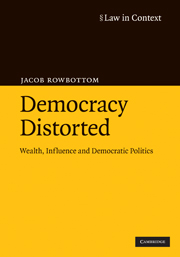Book contents
- Frontmatter
- Contents
- Preface and acknowledgements
- 1 Political equality, wealth and democracy
- 2 Freedom to speak and freedom to spend
- 3 Strategies and reforms
- 4 Access, influence and lobbying
- 5 Beyond equal votes: election campaigns and political parties
- 6 Public spaces, property and participation
- 7 The mass media: democratic dreams and private propagandists
- 8 Participation in the digital era: a new distribution?
- 9 Conclusion
- Index
- References
1 - Political equality, wealth and democracy
Published online by Cambridge University Press: 05 June 2012
- Frontmatter
- Contents
- Preface and acknowledgements
- 1 Political equality, wealth and democracy
- 2 Freedom to speak and freedom to spend
- 3 Strategies and reforms
- 4 Access, influence and lobbying
- 5 Beyond equal votes: election campaigns and political parties
- 6 Public spaces, property and participation
- 7 The mass media: democratic dreams and private propagandists
- 8 Participation in the digital era: a new distribution?
- 9 Conclusion
- Index
- References
Summary
Wealth, power and influence are often mentioned together as symbols of status and prestige. Yet in a democracy, they can make an unhappy combination. If a democratic society is one that treats people as equals, then can it be consistent with an economic system in which the differences in wealth are so great? This tension between the distribution of wealth and democracy can emerge in different ways. Economic inequalities are thought to heighten divisions in society, where the lives and concerns of rich and poor barely seem to have any connection. Such a division based on extreme inequalities in wealth may thereby undermine the prospect for democratic decision-making to be a truly collective enterprise and for citizens in one economic group to understand the position of others. The tension between wealth and politics can also arise more directly, where the former is thought to secure political influence. Concerns about the influence of wealth in politics make the news headlines on a fairly regular basis, relating to a range of topics such as the funding of political parties, lobbying and the power of the media. For example, if MPs and ministers grant privileged access to political donors, or if media moguls command the attention of the public and politicians, it raises a problem for a democracy. Sometimes such influence is thought to have a corrupting effect on politics, suggesting that political influence has been ‘bought’.
- Type
- Chapter
- Information
- Democracy DistortedWealth, Influence and Democratic Politics, pp. 1 - 32Publisher: Cambridge University PressPrint publication year: 2010



